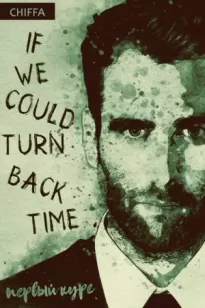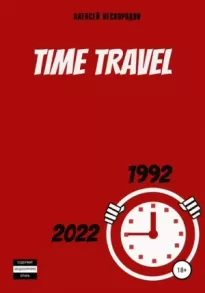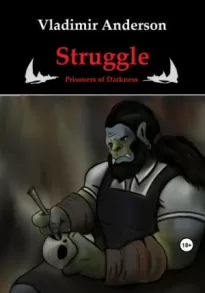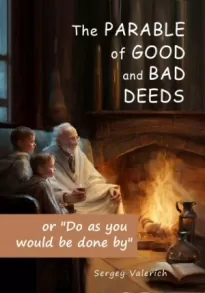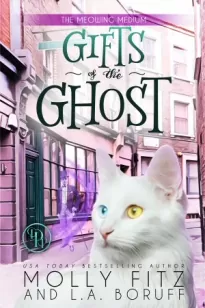TWICE IN TIME
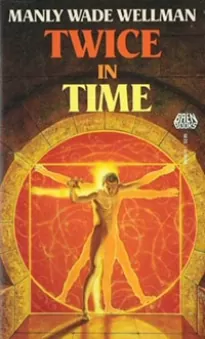
- Автор: Мэнли Веллман
- Жанр: Фантастика
Читать книгу "TWICE IN TIME"
CHAPTER IX The End of the Evening
Guaracco did his best to be the lion of the occasion. Not that he did not merit attention; he could charm and astound and inform. Lorenzo publicly and good-humoredly withdrew his previous opinion that Guaracco was dull, and bade him talk on any subject he would. Strange, philosophy-crammed conversation intrigued Lorenzo, as the jokes of a jester or the gambols of jugglers might intrigue a more shallow ruler.
And Guaracco obliged, with improvements upon my discussion of war machines. To my multiple-fire device, he added a suggestion whereby the crossbows of Lorenzo's guard might be improved—a simple, quick lever to draw and set the string instead of the slower and more cumbersome
The company praised and approved the idea, and Guaracco beamed. He liked it less when Botticelli suggested, and Lorenzo agreed, that I make clearer his rough sketch of the lever action.
"I perceive"—Guaracco smiled satirically—"that you also admire my kinsman's drawing. Has he told you of that other talent he hopes to develop? Flying?"
"Flying?" repeated the beautiful Simonetta, her eyes shining.
"Aye, that. With a machine called an 'airplane.' "
He used the Twentieth Century English word, and I must have started visibly. How did he know the name and invention? I did not remember telling him about airplanes. But Simonetta was already laughing incredulously.
"Belike this young man seeks to soar with wings, and reach those great worlds and suns he pretends to see in the sky," she suggested merrily, a twinkle in her eyes.
"It sounds like sacrilege," Giuliano garnished his sweetheart's apparent effort to embarrass me. "Flight is contrary to man's proper nature."
I was a little angry. "How contrary?" I demanded. "Is it more contrary or sacrilegious than to ride comfortably and swiftly on the back of a horse."
The abbot came to my support. "The young man says sooth," he pronounced. "Holy writ sings of the righteous: 'They shall mount up with wings as eagles,' and again, in the words of the Psalmist himself: 'O, that I had wings like a dove!' Surely such flight would not be ungodly, unless it were accomplished by the aid of black magic."
"Well, Ser Leo?" Lorenzo prompted me.
He leaned back in his cushioned chair of state, crossing one long nobby leg over the other. His companions grouped themselves gracefully, if syco-phantically, around him. All were waiting for my reply to the abbot's last suggestion.
"Your Magnificence, there is no such thing as black magic," I said, "either in my devices, or elsewhere."
Every eye widened, and Guaracco stiffened as though I had prodded him with a dagger. I remembered that he had come close to frightening me not an hour before, and determined to make some amends to my own self-respect.
"Of all human discourses," I elaborated warmly, watching him, "the most foolish is that which affirms a belief in necromancy." Guaracco glared, but I did not hesitate. "If this necromancy, or black magic, did truly exist, he who controlled it would be lord of all nations, and no human skill could resist him. Buried treasure and the jewels of Earth's heart would lie manifest to him. No lock, no fortress could remain shut against his will. He could travel the uttermost parts of the Universe. But why do I go on adding instance to instance? What could not be brought to pass by such a mechanician?"
As I finished, there was a sigh, a mutter, and finally Lorenzo struck his hands together in applause.
"Well said, Ser Leo!" he cried. "Do you not think so, Guaracco? Does this not prove that there are no sorcerers?"
"It proves, at least, my innocence of the charge of sorcery." Guaracco smiled, and bowed to give the reply strength. "If I could do such things, would I be so humble and dependent a servant of Your Magnificence? Surely"—and his eyes found mine once more— "nothing is impossible to a true necromancer."
"Nothing," I agreed, "except refuge from death."
His smile vanished.
Lorenzo lolled more easily in his chair.
"This bethinks me," he remarked. "One matter has not been settled. Ser Leo is a boy, a student of the arts, yet he conquers with ease my nonpareil swordsman. That smacks of enchantment."
I spread my hands in one of the free Florentine gestures I was beginning to use.
"I make bold to deny that it was aught but skill."
"We must make trial."
His Magnificence permitted himself another faint grin. I must have shown an expression of worry, for Giuliano burst out into confident laughter and sprang forward, hand on hilt.
"Let me do the trying," he cried, his gay, handsome face thrusting at me in the white light of the lamps.
Simonetta's silvery chuckle applauded her cavalier. The abbot also called for this unecclesiastical performance to take place without delay. Before I well knew what was happening, the chairs, benches and other furniture had been thrust back, the lamps trimmed to give more light, and I faced Giuliano in the center of the cleared space. Poliziano had run to fetch something, and he came close to me.
"Here, young sir," he said, "defend yourself." And he thrust a hard object into my hand.
Giuliano had already drawn his sword and wadded his cloak into a protection on his free arm. I transferred my own weapon to my left arm, and at sight of it my heart sank. It was a mere cane of wood, hard and round and of a sword's length, such as Florentine lads used for fencing practice. Giuliano, on the other hand, fell on guard with a blade that was one of the finest and sharpest I ever saw. Plainly, I was to furnish sport for this gallant and his friends, and all the advantages were denied me.
Because I must, I lifted the cudgel to cross his steel. Lorenzo grunted.
"Your cousin is sinister-handed, Guaracco," he observed. "Belike that is the secret of his skill."
"I fear not," said Giuliano, with unmalicious zest, and he disengaged and thrust at me.
Apparently he meant business, for the point would have nicked, wounded my breast had I not shortened my own arm and beat it aside. Cheers went up from the ladies—then slid into dismayed screams. For, extending my parry to its conclusion as a riposte, I smote Giuliano smartly on the inside of the elbow, and he wheezed in pain and sprang back out of reach. Had I followed and struck again, he might have been forced to drop the sword. But I realized that I had to do with the second greatest man in Florence, and only stood my ground.
Giuliano laughed again. "God's wounds, what a tingler!" he praised me. "I'll ward it another time."
Forward he came again, right foot advanced, his cloaked left arm brought well up. Again I awaited his thrust, parried it and drove it out of line, then riposted as before. He, as good as his promise, interposed the folds of the cloak, taking a muffled tap on his left forearm. But that hurt him somewhat, and he retreated. This time I followed him, avoided an engagement, and half struck at his head. But I stopped in time, fearing to injure him and make dangerous enemies. Instead I diverted the course of the stroke into a sweeping
Absolute silence fell, then a murmur of consternation from the onlookers. For Giuliano's smile had vanished, and his eyes flashed fire. Plainly the contest had ceased to be sport with him—my thumps had made him angry. He snapped out a soft blasphemy, advanced quickly, and sped a slashing cut—not at me, but at my stick. The edge of his steel, keen as a razor, shore through the tough wood without effort, and I was left with a mere baton in my hand, a truncated billet no more than fifteen inches long.
"No, no, Giuliano, spare him!" called out Lorenzo, but too late to balk his bother's murderous stab at my throat.
I managed to parry with the short length of wood remaining to me, causing his point to shoot upward and over my left shoulder. At once I stepped forward, well within his lunge. Before he could retreat or recover, my free right hand caught the cross-guard of his weapon, and wrenched. His own right arm, bruised twice in the previous engagements, had lost some of its strength, and in a trice I tore the sword away from him.
At once I dropped my severed stick, fell back and whipped the captured hilt into my left hand.
"By your leave, my lord," I panted, "I will continue the matter with this more suitable equipment."
But then Lorenzo, Poliziano, and Guaracco had sprung forward and between us. The sorcerer caught me in his arms and wrestled me farther back, his red beard rasping my ear as he hissed out a warning to take care. Lorenzo the Magnificent was lecturing Giuliano in the manner of big brothers in every land and generation. And Giuliano recovered his lost temper.
"Hark you, Ser Leo, I did amiss," he called out to me, laughing. "I had no lust to hurt you at the beginning. I meant only fun. And then—" He broke off, still grinning, and rubbed his injured arm. "I forgot myself. It is not many who can teach me either swordplay or manners but, by Saint Michael of the Sword! You have done both."
It was handsomely said, and I gladly gave him back his weapon, assuring him that I bore no ill-will. At that, he embraced me in the impulsive Latin manner, swearing that he would stand my friend forever. The company subsided to chairs again, happy that no harm had befallen either of us.
"We wander from the path of our earlier discourse," reminded Abbot Mariotto tactfully. "Ser Leo was speaking of a flying machine. Where is it, my son?"
"It is not yet constructed, Holy Father," I replied.
As with so many other things, the principle of flying a heavier-than-air machine was caught only vaguely in the back of my head. I could visualize roughly the form, a thin body with a rudder for tail and outspread wings. And something to stir the air.
"Belike you would strap wings to your arms," suggested Giuliano.
"Impossible," spoke up Poliziano. "Are not men's arms too weak for flight? Would there not need great muscles, at least as strong as those of the legs?"
I had an inspiration, and an answer. "The muscles of our legs are many times stronger than needful to support the weight of our bodies," I told him.
Lorenzo, eager as always for new philosophic diversion, challenged me to prove it. I asked him to get me a long, tough plank, and servants were sent scurrying after it. While I waited, I chose a strong, straight chair, and sat upon it. A cushion I took and laid upon my knees. When the plank arrived, I balanced it upon this cushion.
"Now, come, all of you," I invited, "and rest yourselves upon this plank."
Lorenzo did so at once, and then his brother. The others followed laughingly, not excepting the abbot and Madonna Simonetta—ten in all, supported upon my knees. Only Guaracco stood aloof.
"Your long shank support many hundredweight, my stout Cousin," he said, "but what does this prove?"
"It proves his argument, and the fallacy of mine," handsomely replied Poliziano for him, as he rose from his seat at one end of the plank. "His legs have tenfold strength, and his arms may be strong in proportion, enough to flap his wings and waft upward his entire weight."
"Then let me see it done," pronounced Lorenzo, with a grand finality that made my heart sink. "I am ambitious, Ser Leo, to watch you 'mount up with wings as eagles.' And I do not forget the other arrangement, by which you will make solid shot to explode."
This last labor, which I had been glad to slight in conversation, now seemed actually the easier.
But Simonetta and the other ladies professed themselves weary of cold science, be it ever so important in a masculine world, and demanded music. Poliziano, whose voice was as sweet as his appearance was ungainly, immediately snatched up a silver lute and picked out a lively tune. The song he rendered was saucy and merry, and not a little shocking; but the holy abbot led the loud applause.
"More! More!" cried Simonetta.
Poliziano, bowing low to her, sang to a more measured and dignified tune, an offering that had all the earmarks of impromptu versification, inasmuch as it mentioned the beauty of Simonetta, the magnificence of Lorenzo, the churchly dignity of Abbot Mariotto and, finally, the enigmatic quality of my own discourse.
"And will not Ser Leo sing?" asked one of the ladies when Poliziano had made an end. "His conversation and talents are so varied—war, science, debate, flying like a bird—"
"Let us hear your voice, young sir," Lorenzo commanded me.
Thus urged, I took Poliziano's lute, altering the pitch and harmony of its four strings until I could strum upon it in a hit-or-miss fashion, evoking chords to accompany myself. The song which I managed to improvise and sing to Poliziano's tune was on the subject of stars, so edifying to my new friends and so distasteful to Guaracco. Since Lorenzo and the others commended it highly, it may not be amiss to set it down here.
You think I am a spark—I am a star.
You think that I am small, but I am great.
You think me dim, but I am only far,
Far out in space, beyond your love and hate.
You think me feeble—but I am a sun,
Whose rule is resolute, whose face endures,
Beneath whose heat and light are wonders done,
Throughout a least of nobler worlds than yours.
You think you know my secrets, and you say
That they are thus—but, through the sky,
My beam strikes from so many years away,
You know not how I live, nor when I die.

